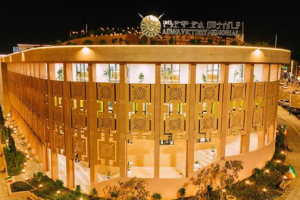As many political analysts who wrote on Ethiopian political culture agree, the absence of a democratic political tradition in the country is largely caused by the absence of compromise or deal making among the key players, namely the intellectual elites and the parties they lead. This has in turn led to the culture of a zero-sum-game in which winners take all and losers are excluded from the political game. The last forty or fifty years since the demise of the monarchy, Ethiopian politics could not produce a win-win solution to the many problems the nation faced in its quest for a stable, predictable and functional system of governance and in the complex process of building a functioning modern state.
Many observers of Ethiopian political history agree that nation building in the modern sense of the term started in Ethiopia by emperor Menelik who, forcefully or through compromises, extended his rule all over the country in his vision of building not only a unified territorial entity but also a modern nation that had alluded all the leaders before him. Emperor Teodros had a great vision of a united Ethiopia under a strong monarchy but his dream largely failed to materialize because it was based on the indiscriminate use of force against his political opponents as well as against ordinary peasants whom he accused of collaborating with his enemies.
As many historians testify, Menelik’s rule was a positive advance as far as national unification was concerned, compared to that of Teodros, because he introduced the art of political compromise in dealing with opponents of his imperial regime who tried to frustrate his unifying scheme and his nation building approach that started from the centre and radiated all over the geographic entity we now recognize as Ethiopia’s sovereign territory.
Being an astute politician, Menelik’s softer approach to deal making helped him win over his former arch enemies to his side through intermarriages, appointments and political alliances against those forces who tried to carve up their respective dominions. Menelik saw in this project of restoring the divisions that were weakening Ethiopia under the Era of the Princes as a threat not only to his rule but also to his grand vision of Ethiopia as a homeland for the various ethnic and national entities that vied for domination and posed the threat of political fragmentation. As subsequent events proved, Menelik’s diplomatic and flexible approach to nation building was the key factor that helped him shape a unified popular army that withstood foreign aggression and helped him win the Battle of Adwa, his single most remarkable achievement.
It may not be an exaggeration to characterize Emperor Menelik as the great deal maker in internal and external politics as the annals of history testify. Emperor Haile Sellassie who came after him polished this art of political compromise to perfection in his half a century rule during which time the present shape of Ethiopian crystallized amid foreign invasion and internal dissent.
We should not however absolve both emperors of the mistakes they made in their respective times when they either used excessive force to realize their dreams or failed to make compromises when it came to the long term interest of Ethiopian unity. The crisis of Eritrean federal experiment was one such instance that subsequently led to the birth of secessionist political tendencies that were exploited by Ethiopia’s foreign enemies and led to the conflicts we witnessed around the end of the Haile Sellassie era.
The rise of the Ethiopian student movement in the 1960s, the emergence of a Leftist intellectual groups and the 1974 Revolution rather exacerbated the divisions instead of healing the political schisms of the previous decades. The ethnic and nationalist consciousness that were forced upon the masses in the various parts of the vast empire were wrongly perceived as a project for democratic unity.
As the decades after the Revolution and until the recent demise of the EPRDF regime amply demonstrate, the ethnic and national awareness that were forced upon the people are having counterproductive effects because they were not managed democratically and in the interest of the entire people of Ethiopia.
Extremist and nationalist political movements could thus mushroom and undermine the democratic ideals of the February Revolution giving rise to a culture of violent confrontations between narrow ethnic political aspirants for power and the central authorities whose commitment to Ethiopian unity by any means closed the door on the possibility of political compromise or deal making while avoiding a possible implosion
Some commentators attribute the absence of compromise in Ethiopian political culture to the highlanders’ culture of violence and inflexibility in dealing with their opponents. This may however be an exaggerated opinion since the absence of deal making in Ethiopian politics is not a phenomenon limited only to northern regions but a general political attitude that was imposed by the intellectual elites born of the 1974 Revolution as the central government and the central regions were the scenes of the violent political vendettas that characterized the post-Revolution period.
From 1974 to roughly 2018, Ethiopian politics was characterized by the absence of a culture of compromise and deal making in a democratic context. Elections were either rigged, high jacked or amounted only to deceptive exercises by the ruling elites. Elections or political parties are not new to Ethiopia. There were regular elections to the lower house of parliament during the imperial era. However, these elections were regular exercises in conformism and a semblance of democracy. Neither the Derg elections or those under the EPRDF could overcome the democratic deficits of the previous regimes or lead to the emergence of a culture political compromise or deal making.
The 2018 popular movement for change and the ensuing reformist agenda have created, perhaps for the first time in the modern history of the country, an opportunity for real compromise and unity based on democratic principles. A few years prior to the 2018 reforms, it was difficult to imagine former political opponents sitting together in a hall and freely presenting their programs or articulate their visions of Ethiopian democracy. Although the process has already proved rocky and the future unpredictable, the political reforms have once again revived the dreams of millions of Ethiopians for the emergence of a peaceful political culture predicated on compromises, flexibility or deal making.
Unfortunately however, the emergence of extremist divisive tendencies in almost every national and ethnic movement is threatening to undermine the political enthusiasm that the reform process had created earlier in the process. In vast and complex country like Ethiopia, with a difficult history of national building and struggles for power, it was a bit naïve to expect a neat and swift transition from authoritarianism to democracy in the absence of a strong democratic culture. That is why the political optimism of the earlier days of the reform process could dissipate and give rise to soul-searching meditations into the challenges that threaten to derail the process as they did during the revolutionary years as well as the previous changes of government.
Ethiopian history had created multiple opportunities for the emergence of a democratic political culture. The 1974 Revolution had opened up new avenues for changing the culture of autocracy into a flexible culture of democratic deal making. State power was however, the main focus of the various aspirants and the grand project of changing the political culture was overlooked by the different players.
The intellectual elites were rather concerned not about compromise, consensus or flexibility but focused on immediate political gains. The optimism and popular enthusiasm the Revolution created quickly degenerated into disillusionment and hopelessness that engulfed every political movement and ended up in disaster.
The year 1991 had also created another opportunity for changing the country’s political culture. The Derg was gone and its place was taken over by what was then known as the EPRDF, an agglomeration of the main ethnic-based movements that emerged on the grave of the military regime. A second disaster occurred as the ethnic groups vied for supremacy and domination instead of working together for a culture of political tolerance, compromise and consensus. Their dealings with opposition groups were managed with the traditional method of repression and exclusion or marginalization.
It has taken thirty years between the change of government in 1991 and the emergence of a mass movement for change or reforms. These years were lost years because they were years of absolute domination of one group, namely the now defunct TPLF, over the rest and the consolidation of the process of ethnic and national fragmentations and weakening of the political fabric. A culture of mutual suspicion, intolerance and slow motion extermination was the order of the day. No meaningful initiatives could be taken to overcome those deficits in governance and put the democratic process back on track.
The historic debacle of the 2005 elections had definitely proved that the EPRDF system was closed to reforms and the regime was determined to stay in power by hook or by crook. The authorities misread or ignored the creeping crisis and deluded themselves into believing that no force on earth could challenge them and less defeat them.
They were not open for dialogue and less for compromise. Even when they see their political sun setting, the old authorities took the sign not as the end of their rule but as something déjà vu. They claimed that the EPRDF was able to rise from the ashes like the mythical Sphinx. That was the cardinal sin that led them to commit horrendous political mistakes that led them to their final disaster.
The ongoing reform process in Ethiopia is fragile and facing multiple threats both from within and without. Anti-GERD forces are looking at the situation as an opportunity for implementing their destabilizing project by any means available. Internal centrifugal forces are working to create a political chaos to fish in troubled waters. In the face of these enormous challenges, the decisive factor is no doubt the people’s cohesiveness and determination to take the reform process to a new and stronger level. And this can be achieved and consolidated only through a democratic election and popular legitimacy. It is only then that a culture and a culture of tolerance and mutual accommodation would start to take roots and sprout. Any other alternative is something already tried and proved a failure. Ethiopia’s history of failure or self-defeat in democratic experimentation should not be allowed to repeat itself this time around.
BY MULUGETA GUDETA
The Ethiopian Herald May 23/2021





